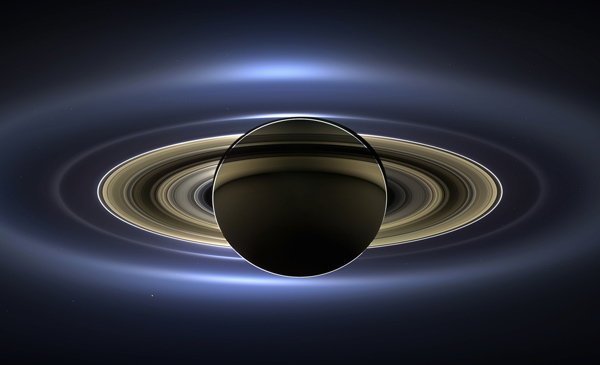The Daily Escape:

Image of Saturn taken from the Cassini spacecraft on July 19, 2013
Wrongo has read much of the evidence that Russia interfered with the 2016 US Presidential election. He has watched House and Senate committees ask the intelligence community and the Justice Department what is known and not known about the Russian hacking story.
It is clear that the Russians have extremely capable cyber technicians. They have a pragmatic view about getting what they need strategically, so it is both feasible and possible that they could have been disruptive to our democratic process.
But is there actual evidence that Russia interfered in our elections in 2016? And if they did, is there evidence that the Trump campaign colluded with them? The answer so far is summed up by Caitlin Johnstone:
Russiagate is like a mirage: from a distance it looks like something, but once you move in for a closer look, there’s nothing there. Nothing. Nothing solid, nothing substantial, nothing you can point at and say, “Here it is. This hard evidence justifies saturating the media waves with obsessive 24/7 coverage, escalating tensions with a nuclear superpower, stagnating political discourse in America and fanning the flames of a hysterical, xenophobic McCarthyist feeding frenzy.”
Most of what we know comes from the intelligence assessment by James Clapper when he was the Director of National Intelligence (DNI) for Obama; Assessing Russian Activities and Intentions in Recent US Elections. Here are the conclusions:
- We assess Russian President Vladimir Putin ordered an influence campaign in 2016 aimed at the US presidential election.
- Russia’s goals were to undermine public faith in the US democratic process, denigrate Secretary Clinton, and harm her electability and potential presidency.
- We further assess Putin and the Russian Government developed a clear preference for President-elect Trump.
- Moscow’s influence campaign followed a Russian messaging strategy that blends covert intelligence operations—such as cyber activity—with overt efforts by Russian Government agencies, state-funded media, third-party intermediaries, and paid social media users or “trolls.”
From Sic Semper Tyrannis:
The assessment says Russia did three basic things to “influence” the Presidential election. First, the NSA, CIA and, to a lesser extent, the FBI, believed that the Russians hacked into the DNC and John Podesta emails, then passed that content to WikiLeaks and DC Leaks, who subsequently published the information. Second, the Russians supposedly obtained access to “elements” (undefined) of US state or local electoral boards. Third, Russian media outlets, RT and Sputnik News, put out Kremlin friendly messages.
There is no evidence backing up the claim that the Russian intelligence service hacked the DNC and Podesta that has been presented to the American people. The FBI did not conduct a forensic examination of the computers of either the DNC or of Podesta. The belief that the Russians did it is based on an independent firm, Crowdstrike’s examination of the DNC emails. Moreover, the release of Podesta’s emails had little to no effect on the election, while the Comey on-and-off-and on again investigation into Hillary Clinton’s emails were certainly damaging to her electoral chances.
The larger point is that Democrats have convinced themselves that getting rid of Trump justifies throwing pasta (or any other sticky substance) at the wall to see what sticks. And that is what is happening with the “all Russia, all the time” hearings in the House and Senate.
An important subtext to this whole Russian conspiracy theory is the insistence that the Trump campaign colluded with Vladimir Putin to sabotage Hillary’s campaign. That is repeated endlessly on the cable channels, and has become an article of faith to many Americans, especially Democrats. But, a few meetings do not create collusion. Possibly the intelligence community has some proof, but it has not been presented in a form that inspires credibility.
About a month ago, the DOJ appointed a Special Counsel to ferret out what is real from what is fake in the allegations about Russiagate, from hacks to collusion.
Let’s hope that he gets to the bottom of the story.
In the meantime, stay focused on the potential damage that Messrs. Trump, McConnell and Ryan are trying to do, from the gutting of Dodd-Frank to passing an Obamacare replacement that hurts many Americans.
Now for a tune. The Beatles’ “Back in the USSR” was released in 1968. It was intended to be a parody of “Back in the USA” by the Beach Boys. The song shocked many at the time for its pro-Soviet message. Years later, Paul McCartney stated he knew very little about the Soviet Union when he wrote the song. Here is McCartney doing the song live in Moscow’s Red Square:
Note Putin vaguely rocking @ 0:14
Those who read the Wrongologist in email can view the video here.
